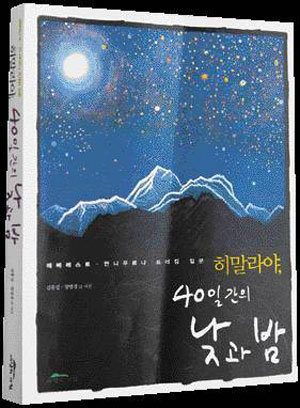Blue Rungda

When a blue rungda is waving/My heart also floats/Birds are flying high in the sky/White clouds float by//My beloved/Let me go for a while/With a gentle smile/Pack my sack//For you are waiting/I will come back/When a blue rungda waves/I will come back like the wind. (Blue Rungda)
Rungda is a flag with Buddhist scriptures that Himalayan minority tribes hang on a tree or a rock. Suffering and exhausted pilgrims are reinvigorated as they gain the heart of Buddha through the flag.
To the authors, poet Kim Hong-seong and his wife Jeong Myeong-gyeong, Himalaya is Rungda. It is home and mother for those whose body and mind is worn out in search of a path of salvation. Blue Rungda was made when Kim wrote lyrics to the song The Water Is Wide. It was Jeongs favorite song.
The book is a record of trekking around the Kumbu region of Chomolungma (aka Mt. Everest) and Annapurna, which means white rice stacked up on a tray.
Pilgrims of Himalaya who kept a Korean restaurant named Sopung for over 10 years in Kathmandu, Nepal, Kim and Jeong ask profound questions about the origin of humans in the book: Where are you going and what are you looking for?
To them, Himalaya looks like old priests of the giants in meditation or gods immersed in contemplation. They feel like stepping on the threshold of the other world when they stay at a place nearly 5,000m above the sea. An appetite comes back, flowers and girls look pretty, or even heinous men look simply pitiable.
The book is visual with lots of pictures. Engrossed in the book, readers will feel like they are joining the writers pilgrimage. As the camera follows the pilgrimage, readers can feel the magnificence of the snow-covered mountain, the everyday life of the minority tribes, which is being touched by the mirage of capital, and a hunger for the ultimate. There is no exaggeration in the writing. The book delivers what there is in the Himalayas with warm compassion for nature and human beings and an inevitable sense of nothingness.
Jeong passed away early July after her struggle with liver cancer. Kim became poet when Goh Eun recommended him 20 years ago and published his first collection of poems titled By the Window with Morning Glory Blooming just three days before his wife died.
She is not there. I know it because transformed into a puff of smoke, she was there in the farewell scene. Her bright smile, her singing of Blue Rungda rang in my ears like from the other world (from novelist Shin Yeong-cheols recommendation).
yyc11@donga.com







